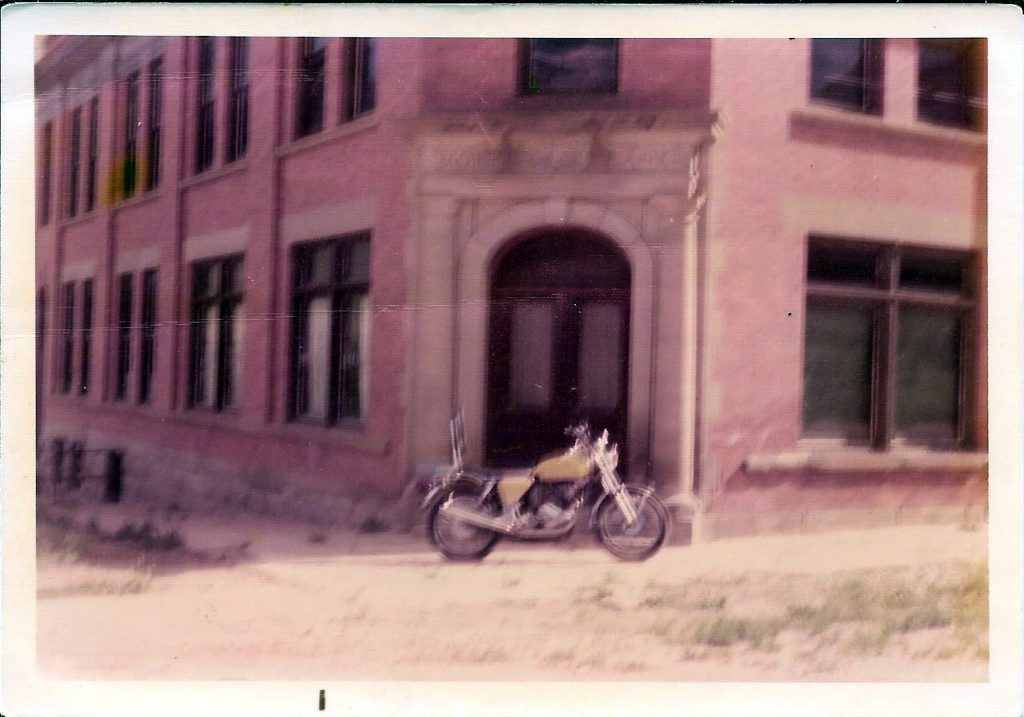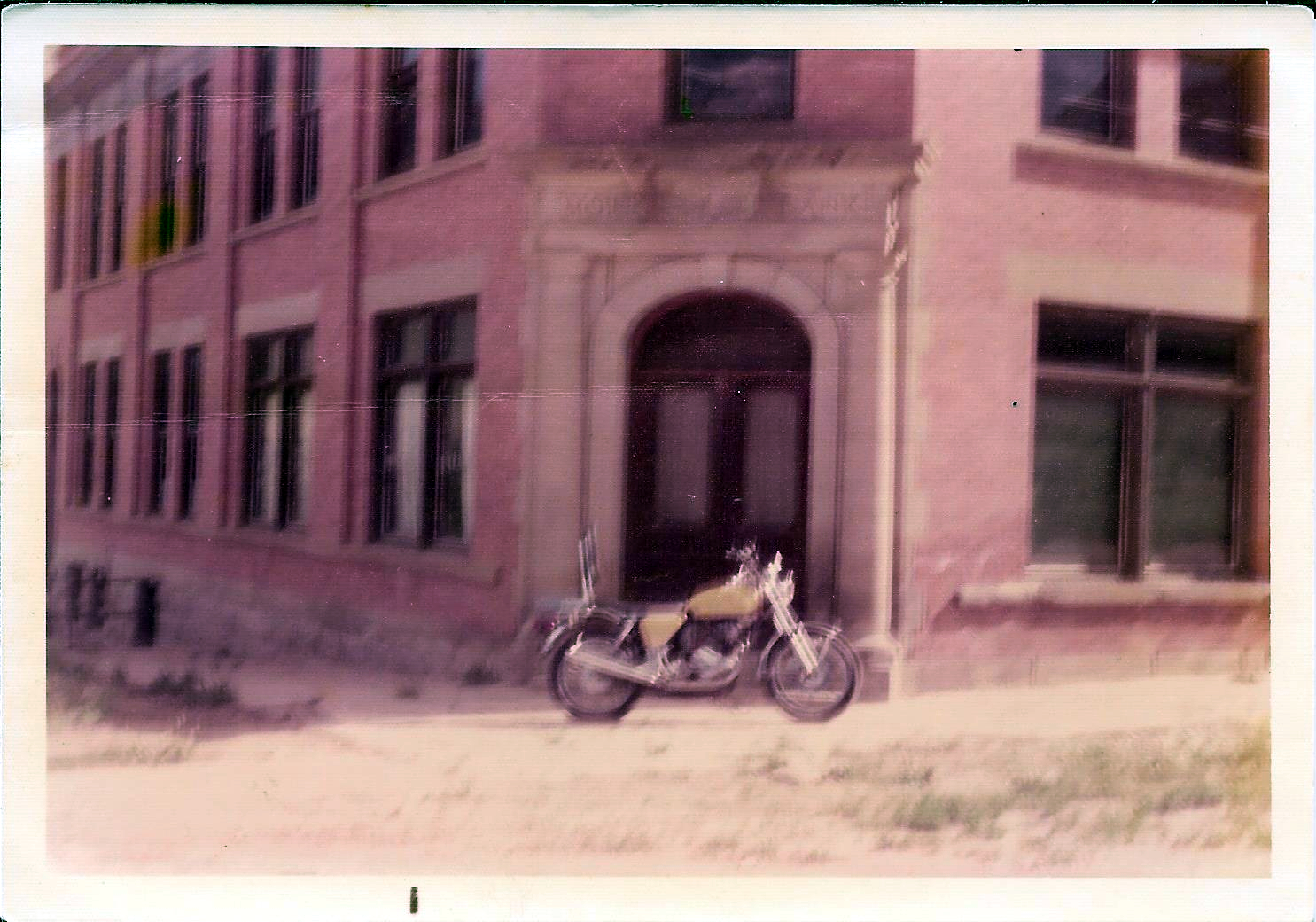
I remember them on their horses; ghosts floating with the mist on the mountain grass.
I squatted by my Norton Commando motorcycle as the late-day August heat wafted off the asphalt. The engine and exhaust pipes tinkled as they cooled. I was on my way to Portland, but took a scenic route through the Shoshone tribal lands, just off the Clearwater River highway in Idaho. The sun streamed through the tall trees. If I didn’t get the roadster running, I would be sleeping by the roadside.
My shop rag of tools was rolled out on the ground. They looked like a Civil War surgeon’s crude amputation kit. I popped off the side casing for the ignition system and peered at the contact points. One of them had fallen off.
I was on my way back from an adventure to Pony, Montana. I had friends there who were reopening a gold mine that had been closed since 1942 when the government seized it from its Japanese owners. Thirty years later most of the shafts were riddled with cave-ins. I worked days with a crew mucking out and re-timbering the shafts. The afternoons we rounded the mine property in an old Jeep, carrying Winchesters and looking for claim jumpers. We felt like a movie.
One afternoon we came upon two guys on horseback, working a stream for gold. “Y’all can’t be here,” our boss said as he stepped off the Jeep. They both turned, pulled six-guns, and fired. One bullet slapped a tree . I tumbled out and took cover behind the rear wheels. They fired again.
“You sons ”o bitches,” hollered the boss. He drew his pistol and let off a shot that was way wide. He looked over his shoulder at us cringing. “Fire, dammit!”
It occurred to me I was being paid $35 a day to dig out collapsed mine shafts and shoot at people stealing someone else’s gold. And whose gold was it? The new owners? The Japanese the government seized it from? The Native Americans who were here when white men claimed it?
The three of us poked our heads up, shouldered our Winchesters and fired; doing an excellent job of missing them. They scrambled onto their horses disappeared.
Back at base, we went straight for the bourbon. It was the old bank building from the days when Pony was a bustling mining town. We slept on cots in the lobby, the barred teller windows staring down at us. The rest of Pony was a patchwork of maybe a few dozen buildings that some very hardy people called homes.
We sat in the lamplight and pondered the danger we had escaped. A bat flew into the building and flitted around our heads. Someone grabbed a shotgun and chased it around the bank, blasting away at it as big chunks of ceiling dropped to the floor in a cloud of plaster dust. The bat got away.
That was my last night in Pony. I rode out for Portland in the morning.
Now, here I was in Shoshone territory, staring at my Norton, wondering If I was going to get back on the road or sleep in the grass. The tall mountains around me were turning to purple shadows and a light mist was forming along the tall grass of the high prairie. Wind slithered through the trees. I got up from the bike and walked in a circle, wondering how I might get the contact points working again.
Then I saw the four Shoshone on horseback. They were a ways off, riding at a walk in the sunset. They spotted me and turned their horses in my direction. I wondered if they might help. I wondered if they might now. I wondered what they thought of guys in black leather on motorcycles sleeping on their land. They rode up to the fence by the road, about thirty feet away, and they just looked at me. Their horses were Paints and Appaloosas, muscled and lathered from riding. They stamped and sidestepped and snorted. The riders were dressed in jeans and flannels with black cowboy hats.
“Hi, guys,” I said, and smiled. They didn’t smile. I decided to get busy with the bike. They watched in silence as I worked on the contact points. One was still intact, but the other had come loose and was gone. I remembered I had some aluminum foil I had used to wrap a sandwich for the trip. I dug that out of my pack, tore off a small strip, and wound it around the contacts. I twisted and squeezed the foil tight. Maybe it would serve as a contact and stay on at least until I could get to a town. It was getting dark now. Using a flashlight, I put the cover back on and kick-started the engine. It sparked and fired up, sputtering badly. I looked up at the sentinels. One of them smiled and nodded his head. They turned away and rode off.
Praying the foil would stay in place, I put the bike in gear and eased on the clutch. It didn’t stall. I rolled onto the road, shifting into second. The bike backfired and lurched, but it kept going. I wasn’t able to get over 35, but it kept running. I made my way through the mountains; watching the beam of the headlight bouncing on the asphalt and flickering in the firs as I kept praying that the contacts would hold.
About 40 miles later, I saw a dumpy motel with a neon sign that said, “Vacancy.” Minutes later I was in my tiny room. I conked out, still wearing my leathers, and had a strange dream that I can’t remember. All I have from that wispy dream is a note I wrote when I woke up: “Don’t forget to write the story about the dead Indians in the church.” To this day, I have no idea what that story was, but I do remember the Shoshone on their horses in a twilight haze in the mountains, silent sentinels, watching me, but seeming not to regard me. The universe is like that sometimes.

